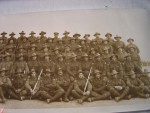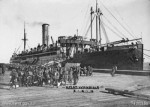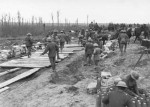COBB, Alexander
Alexander Cobb was the son of Alexander and Catherine Cobb, nee Buchanan. His father is described in the Electoral Rolls as a cook, while the son is a warehouseman, alnd later, a storeman. He had served an apprenticeship Needham, Carter and Pirrie Coy, Melbourne, and may have still beeen working there when he enlisted. There was one other child, a daughter, Alice Maud Cobb, born in 1888, while Alexander himself was born in 1890. The family lived at 107 Powlett St., though at the time Alexander was filling in enlistment form, his father was away from the family and his address unknown.
Young Alexander enlisted on 3 March, 1916, and was called up for training ten days later. He was sent to Cambellfield, Victoria, where he was attached to the 1-6 Reinforcements, 3rd Pioneer Battalion. The Pioneer Battalions contained the 'handymen' of the army, with one Pioneer Battalion attached to each division. They constructed lines of communication, dug trenches, built duckboard paths and temporary bridges, were in charge of supplies and ordnance, and did other similar jobs, often in the direct line of fire. The reinforcements left Melbourne on 6 June, 1916, on board the HMAT Wandilla A62, disembarking in England on 29 August. Once in England, Alexander Cobb was transferred to 8th Divisional Headquarters, then on join the 3rd Pioneer Battalion.
From here, his military record is sparse. The 3rd Pioneer Battalion remained in England until November, 1916, when they were transferred overseas to France and the Western Front. Alexander Cobb left England on 22 November, but his record lacks any further detail and it is unclear what role he had at this stage, as a note on his record shows him to have been detached to the Ordnance Corps on 12 February, 1916, and with them again in February, 1918 . However, the unit histories show that the 3rd Pioneer Battalion was sent first to Armentieres, where on 13 December, Cobb was promoted to Corporal, and in 1917, to Messines, then on to Flanders. Here they were engaged in battle at Polygon Wood, Broodseinde and Passchendaele. In 1918, they fought at St Quentin in March, Ypres in May, and Hazebrouk in July. Alexander Cobb was to receive a commendation on 26 May, 1919, with his record noting that he was 'Congratulated on his courage and devotion to duty in saving stores from a bombarded town during 20/4/18 - to 5/5/1918'. It seems that either the Ordnance Corps was a subsection of the 3rd Pioneer Battalion or that he moved in and out of the two units.
As the war came to an end, the Pioneer Battalions had much work to do in restoring bridges and roads, and in returning the battlefields to civilian areas again. From May, 1918 to April, 1919, Cobb remained in the field, first with the 3rd Division, then the 2nd Division, then back again to the 3rd Division. On 29 May, 1919, he was working in the Records Section in London. He must have remained there until he was sent home, leaving London 5 August, 1919, on board the Katoomba.
In the 1919 Electoral Roll, Alexander Cobb was working as a warehouseman and living with both his mother and father at 107 Powlett St., East Melbourne. That same year, he married Gwlym Irene Maud Atkins, known as Maud. In 1924, they were living at 9 Maritana Avenue, Preston and he was working as a storeman. By 1931, they were at Kyneton, runnning the Railway Refreshment Rooms together. In 1936, they moved to bendigo, where he was the railway Station manager. By 1942, they were back at Maritana Ave., as a manager. The last glimpse of him is in 1949, with Maud, living in Latrobe Terrace, Geelong, and again, working as manager.
He died in 1954 at Strickland, Victoria.
National Archives of Australia, Service Record
Australian War Memorial, Embarkation Roll
Ancestry.com.au, Birth Marriage and Death Index



